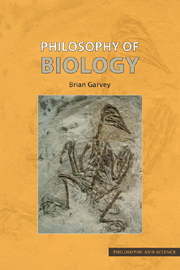Book contents
- Frontmatter
- Contents
- Acknowledgements
- Introduction
- 1 The argument in Darwin's Origin
- 2 The power of genes
- 3 Units of selection
- 4 Panglossianism and its discontents
- 5 The role of development
- 6 Nature and nurture
- 7 Function: “what it is for” versus “what it does”
- 8 Biological categories
- 9 Species and their special problems
- 10 Biology and philosophy of science
- 11 Evolution and epistemology
- 12 Evolution and religion
- 13 Evolution and human nature
- 14 Biology and ethics
- Notes
- Further reading
- Bibliography
- Index
14 - Biology and ethics
- Frontmatter
- Contents
- Acknowledgements
- Introduction
- 1 The argument in Darwin's Origin
- 2 The power of genes
- 3 Units of selection
- 4 Panglossianism and its discontents
- 5 The role of development
- 6 Nature and nurture
- 7 Function: “what it is for” versus “what it does”
- 8 Biological categories
- 9 Species and their special problems
- 10 Biology and philosophy of science
- 11 Evolution and epistemology
- 12 Evolution and religion
- 13 Evolution and human nature
- 14 Biology and ethics
- Notes
- Further reading
- Bibliography
- Index
Summary
In the immediate aftermath of Darwin's work, the idea that the theory of evolution had ethical consequences became quite widespread. Perhaps what makes this idea appealing is the popular notion that the theory of evolution in some way displaces or supplants religion. Religion is, after all, often seen as the source of moral teachings. If the theory of evolution significantly weakens the case for religious beliefs then, it might be thought, it had better generate moral teachings of its own. The alternative might be to be left with no moral teachings at all. However, there are a great many philosophers who think that ethics does not in any way depend on religion for its justification. Many of the early attempts to derive ethical consequences from evolution seem, from today's perspective, misguided. But the idea that we can learn something about ethics from evolution has not gone away.
Fitness as a normative concept
Evolution provides an account of how it is that living things have parts that are purposeful, that are for something. A world of purely physical entities, devoid of life, would presumably also be a world devoid of purposes. Those who are committed to a purely physicalist view of the world, then, are seemingly also committed to the view that purposes came into the world by means of evolution. Evolution explains why hearts, eyes and so on are for something.
- Type
- Chapter
- Information
- Philosophy of Biology , pp. 224 - 250Publisher: Acumen PublishingPrint publication year: 2007



